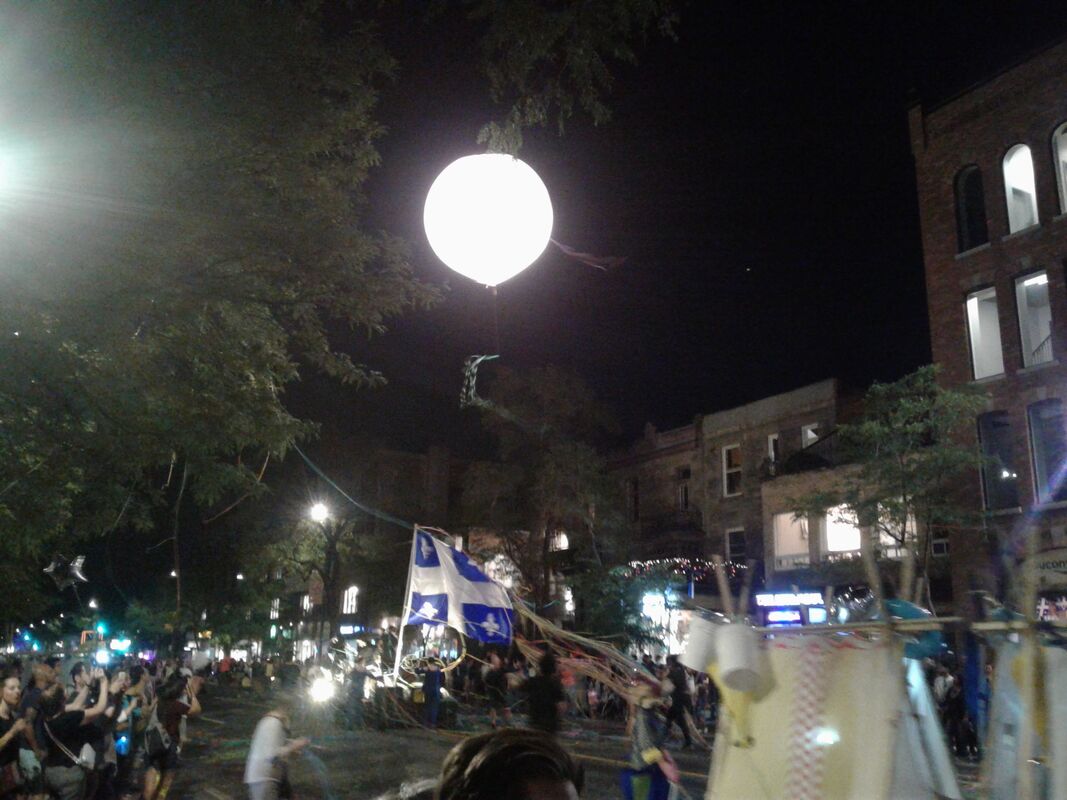|
I should be in Montréal right now. I planned my next research trip over the winter. I booked my flight in January and reserved a room at a centre for female refugees and recent immigrants, where I would be conducting interviews this week. But like everyone else, my life went on pause in March.
I have postponed my trip until next May. A whole year of waiting, and there isn't any guarantee that next May will be better. Yet I am hopeful that the situation will improve, especially in Montréal, which has been gravely impacted by this virus. I search for updates on the city frequently and take notes about how COVID-19 is affecting the city's inhabitants, especially those in the NDG neighbourhood, where my next book is set in the present day. On the surface, it seems like now is a great time to write the next draft of my novel. With no social obligations, we are extolled to develop our creativity and make lemonade out of lemons. Our goal should be to rise from the ashes of self-isolation with a new skill, invention or creation. Social media oozes with proof that people are putting their newfound free time to good use. And maybe some people are. For the majority of us, however, the past two months have been emotionally draining. Just getting through the week takes every bit of energy we can muster. It is hard to tap into your creativity when you are tapped out. When you are emotionally wrought, just the thought of staring at a blank screen adds to the anxiety. Writing fiction is an emotional task. I feel what my characters feel. I have to live the experience with them, to get inside it. Perhaps this is why I prefer to write first thing in the morning, before I talk to anyone, read an email or even turn on my devices. I arrive at my desk, a clean slate emotionally. Fresh from a restful sleep, I am able to transport myself into my fictional world. These days, I am bombarded with thoughts and feelings within seconds of waking. The emotional baggage of COVID-19 is like wearing shackles. The second you move, you are reminded that they are weighing you down. Life has changed. My aunt died in a long-term care home recently. Alone. In spite of the fact that her children and any number of relatives were only a few kilometres away, aching to see her and say their goodbyes. We cannot grieve together as a family. We cannot comfort each other, except through phone calls and video chats. We are learning, each day, how to cope with our new reality. Some days, I accept that which I cannot change. Other days, I struggle with the unfairness. Most days, I rise and fall then get back up again. Occasionally, I am able to write, but I am forgiving of myself on those days when I want to but come up empty-handed. Kindness and compassion are our saving graces in this pandemic. We can lighten the load on family and friends through small acts of kindness and compassion, and we mustn't forget to show the same courtesy to ourselves. We won't all learn a new language, create a masterpiece or become a five-star chef during our confinement. That is okay. In fact, it is unreasonable to expect that anyone would or should achieve greatness under these circumstances. Let's celebrate the small successes (I finally updated my blog!) and stop clutching onto the to-do lists.
2 Comments
On October 15, I will be taking the stage once again. And for the first time, I will be sharing new work from the novel I've been writing for the last two years. It is exciting and a little terrifying.
It will be exciting to see the reception from the audience. This book is completely different from Plastic. It's a novel set in Montréal in present day. The subject matter is darker than my first book. The characters even more unknown to me. Writing the book is an exploration into such completely different lives. It will also be terrifying because the book is still in development. I am deep into the second full draft, and I spent the summer reorganizing the book, twice. While Plastic was told in a linear chronology, each story taking place after the previous, I have been experimenting with the narrative in the new book. Of course, my reading of a short section will not convey those changes. What it will highlight is voice. The two narrators in this book come from very different backgrounds. One is a young girl and the other is a middle-aged woman. The first is new to Canada, while the second has spent her whole life in Montréal. I don't feel that I am completely there yet with either voice. I am still working my way into their heads and hearts. I am still finding them. Which is how the writing process works for me. The deeper I get into their stories, the closer I feel to them. The more they speak to me. While the novel is still a work in progress, I am eager to share a glimpse of what I'm working on. And I'm ready to hear my protagonists' voices through outside ears. If you're in Victoria on October 15, drop by Caffé Fantastico that evening. You can read your own prose at the open mic between 7 and 8 pm. Then stick around for the featured readers. I'll be reading with Al Cool between 8 and 9 pm. I hope to see you there!  Well, more accurately, a research trip. I just spent my vacation in Montréal, where my next book is set. I hadn't been to the city in a long time and I was pleasantly surprised by how much had changed. First off, the city is much more multicultural than I remembered. It was fantastic to see. I stayed in the Mont Royal area for most of my trip, away from the throngs of tourists downtown, and the locals were from many different ethnic groups. I also did research in the NDG and St. Léonard neighbourhoods. I had expected NDG to be diverse, as it has been home to immigrant populations for many decades, but I was blown away by the diversity in St. Léonard. Every neighbourhood I visited, people spoke both English and French. That was another pleasant surprise: how many francophones are bilingual. I always approached people speaking French first. But at the grocery stores and cafés, the staff greeted me with "Bonjour/hello." Sometimes, I responded in French. Other times, I tried English. They were always able to interact in either language. On the Metro and on the street, I heard people flow from one language to the other. Especially young people. They mix the languages seamlessly. It was an eye-opener for someone who left the province not long after the 1995 referendum. What a difference a generation can make. I was in the city for both la fête nationale (Saint-Jean-Baptiste Day) and Canada Day. The celebrations were very robust for the first, but they were certainly not muted for the second. I took in the big concert on June 23 as well as the parade down rue Saint-Denis on the evening of June 24. The parade was more like a circus show with performers donning costumes and recounting the history of the province. The final float, below, brought everyone into the street to dance the night away. There was also a parade on Canada Day, but this one resembled the opening ceremonies for the Olympics. Banners from over 100 countries were proudly carried in front of groups of representatives from those lands. It took over two hours for all of the participants to march, dance, sing or cartwheel past us. There were festivities throughout the day, followed by a free concert in the evening and fireworks over the Saint Lawrence. That was the third pleasant surprise: how many people in the city are proud of being Canadian. Perhaps in many cases, they see themselves as partly Canadian and partly something else (whether that is Québecois, Jamaican, Indonesian or Danish). No matter. It was great to see people waving Canadian flags and cheering on each of the groups represented in the parade. Yes, the city has changed. The tall glass towers along Boulevard René Levesque make the downtorn gleam like other major metropolitan cities. It only takes a stroll along Ste. Catherine or into Vieux Montréal to see how this city is different from Toronto, Vancouver or Chicago. The joie de vivre I remembered from my years in the province has not diminished an iota. A little footnote to my blog post and my trip. After Montréal, I stopped in Vancouver for the Paul McCartney concert. Vancouver is another former home and a city that has undergone so much change since I left. The food is still amazing, and the concert was so much fun. Here are a few pics from the show. Keep rocking, Paul! That was a great vacation.
The Canada Council for the Arts (CCA) held an info session in Victoria at the end of January. The two program officers at the session encouraged attendees to apply for grants and handed out cards for the program officers in each discipline. They suggested we call our individual program officers to discuss applications.
I had applied for a B.C. Arts Council (BCAC) grant last fall and had just learned that my application had not been successful. The timing seemed propitious. Two voice mail messages to the BCAC program officer, seeking feedback on my application, had not been returned. I was hoping that the CCA officer might be more forthcoming. And, to his credit, he was that. Almost immediately, he told me that I was not a strong candidate for a grant because I take too long to write a book. It seems the expectation is that a writer can produce a novel in one year. When I explained to him that I work full-time and can only take so much time off each year, he said I could explain that in my application, but unless the writing sample was exceptional, the peer review group would probably not want to take a chance on me. They grant money to people who they think will finish their project in a timely fashion. Since it took me eight years to finish Plastic, I do not fall into the "timely" category. I hope to complete my next book in five years. But that still isn't fast enough. I was left with the impression that I would only be taken seriously if I gave up my job or at least took a one-year leave to work full-time on the book. I would love to do this, but the reality is that I cannot. My employer would not agree to a one-year leave of absence and my mortgage would not get paid. This is very disappointing news for most writers in Canada. Very few of us earn enough to live on from our writing. In cities like Toronto, Vancouver and Victoria, where housing costs eat up more than half our salaries, taking even three months unpaid leave is a financial impossibility. So in spite of the very positive encouragement from the program officers at the info session, the honest answer is much more grim. I will have to wait until I retire before I can meet the criteria the peer review group seeks. I am disappointed by this answer, but at least now I know the truth. I am grateful for that. A year ago, I welcomed Cory into my home and my heart. She was a life-changer from the first day. I had no idea going into this that raising a puppy for the BCAGD would impact every facet of my life. Boy, did it ever. The very best moments with Cory happened frequently: having her fall asleep with her head in my lap, watching her romp and play with her toys, seeing her understand and apply the training and having her look up at me with such loving eyes when we went for a car ride. My heart swelled for the puppy and each cuddle strengthened the bond between us. I had imagined this. In fact, I had mainly considered this when I signed up for the volunteer position. I hadn't considered the amount of sacrifice it would take to do the job properly. And I hadn't fully understood how these sacrifices would impact other people in my life. I have to thank my supervisor for being so unfailingly understanding. I could not have done this without her support. And I need to thank all the friends and fellow puppy raisers who helped me with Cory. Their assistance was invaluable. The worst moments with Cory happened on a regular basis in the beginning and now occur on only rare occasions. She had separation anxiety and could not control her outbursts of energy (excitement and frustration led to her jumping, snarling, biting and zooming around the house at full speed). The list of things she destroyed is fairly long: shoes, clothes, baseboards, Christmas lights, phone and TV cords, greeting cards, blankets.... Pretty much anything she could get her teeth on suffered. Now, it is only her toys that are ripped apart (under supervision). The hardest part of being a volunteer puppy raiser (and one I never considered) was the toll it took on my health. From lack of sleep to a repetitive strain injury, I seemed to go from one hiccup to the next. I had no idea how physically demanding this role would be. I have learned that a person needs a great deal of strength to train a puppy in this program. The easiest part of the job was crushing on the puppy, when she was very good and when she was just plain goofy. Cory loves people and is always overjoyed to see me after I have been away or she has been with another volunteer. She wakes up happy, is always eager to play and have fun, is excited every time I take her to the gym, a coffee shop, on a walk or to the park. She puts me in a good mood, even when my shoulder is aching. So it is with a mix of pride and sadness that I prepare Cory for the next phase in her journey. She moves on to advanced training to be an autism support dog on November 27. I think she will make a young boy or girl very happy. She loves training and will be eager to learn how to help her new master. I look forward to receiving updates on her progress and to seeing her with the lucky child whose life she will change forever. I will miss Cory and the house will feel very empty without her. The year of the dog ends a bit early for me. But oh, what a year it has been! |
|




 RSS Feed
RSS Feed